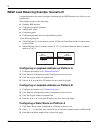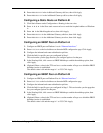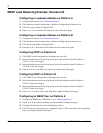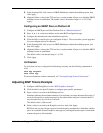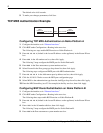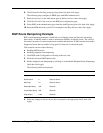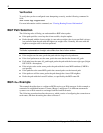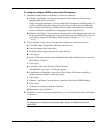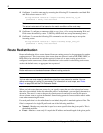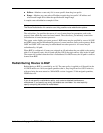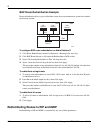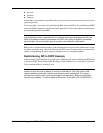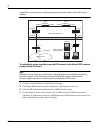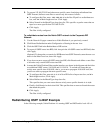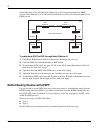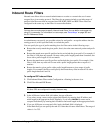
9
438 Nokia Network Voyager for IPSO 4.0 Reference Guide
4. On Router 1, use this route map by executing the following CLI command to send both IPv4
and IPv6 unicast routes to AS 2.
set bgp external remote-as 2 export-routemap advertise_to_as2
preference 1 family inet-and-inet6
Note
The actual routes sent will be based on the match conditions of the route map.
5. On Router 2, configure a routemap called accept_from_as2 to accept incomming IPv4 and
IPv6 routes advertised by router 1. (BGP by default does not accept incomming routes.)
6. On Router 2, execute the following CLI command to use this route map to accept the
incoming routes.
set bgp external remote-as 1 import-routemap accept_from_as2
preference 1 family inet-and-inet6
Route Redistribution
Route redistribution allows routes learned from one routing protocol to be propagated to another
routing protocol. This is necessary when routes from one protocol such as RIP, IGRP, OSPF, or
BGP need to be advertised into another protocol (when two or more routing protocols are
configured on the same router). Route redistribution is also useful for advertising static routes,
such as the default route, or aggregates into a protocol.
Note
Route metrics are not translated between different routing protocols.
Note
You can also use route maps to redistribute routes from one protocol to another. You can
define route maps only using CLI commands. For information on route maps, see “Route
Maps” on page 353 and the CLI Reference Guide.
When you leak routes between protocols, you specify routes that are to be injected and routes
that are to be excluded. In the case where the prefix is redistributed, you can specify the metric to
advertise. The metric is sent to the peer by certain protocols and may be used by the peer to
choose a better route to a given destination. Some routing protocols can associate a metric with a
route when announcing the route.
For each prefix that is to be redistributed or excluded, the prefix is matched against a filter. The
filter is composed of a single IP prefix and one of the following modifiers:
Normal—Matches any route that is equal to or more specific than the given prefix. This is
the default modifier.
Exact—Matches a route only if it equals the IP address and mask length of the given prefix.



